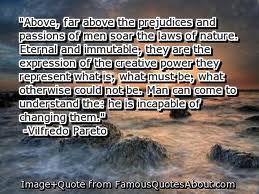The basic premise of
crude, primitive tribal collectivismis the notion that
wealth belongs to
the tribe
or
to society as a whole,
and that
every individual has the “right”
to “participate” in it.
The tribal premise
underlies
today’s political economy.
That premise
is shared
by the enemies
and
the champions of capitalism
alike;
it provides the former
with a certain inner consistency,
and disarms the latter by a subtle,
yet devastating aura of
moral hypocrisy
 —as witness, their attempts to justify capitalism on the ground of “the common good (of the tribe)” or “service to the consumer” or “the best allocation of resources.” (Whose resources - whose tribe?)
—as witness, their attempts to justify capitalism on the ground of “the common good (of the tribe)” or “service to the consumer” or “the best allocation of resources.” (Whose resources - whose tribe?) If capitalism is to be understood,
it is this tribal premise
that has to be
checked—and challenged.
Mankind is not an entity, an organism, or a coral bush. The entity involved in production and trade is man. It is with the study of man—not of the loose aggregate known as a “community”—that any science of the humanities has to begin.
Political economists—including the advocates of capitalism—defined their science as the study of the management or direction or organization or manipulation of a “community’s” or a nation’s “resources.” The nature of these “resources” was not defined; their communal ownership was taken for granted — and the goal of political economy was assumed to be the study of how to utilize these “resources” for “the common good.”
The fact that the principal “resource” involved was man himself, that he was an entity of a specific nature with specific capacities and requirements, was given the most superficial attention, if any. Man was regarded simply as one of the factors of production, along with land, forests, or mines—as one of the less significant factors, since more study was devoted to the influence and quality of these others than to his role or quality.
Political economy was, in effect, a science starting in midstream: it observed that men were producing and trading, it took for granted that they had always done so and always would—it accepted this fact as the given, requiring no further consideration—and it addressed itself to the problem of how to devise the best way for the “community” to dispose of human effort.
A great deal may be learned about society by studying man; but this process cannot be reversed: nothing can be learned about man by studying society—by studying the inter-relationships of entities one has never identified or defined. Yet that is the methodology adopted by most political economists. Their attitude, in effect, amounts to the unstated, implicit postulate: “Man is that which fits economic equations.” Since he obviously does not, this leads to the curious fact that in spite of the practical nature of their science, political economists are oddly unable to relate their abstractions to the concretes of actual existence.
From Ayn Rand : Capitalism - The Unknown Ideal ... What is Capitalism ?





